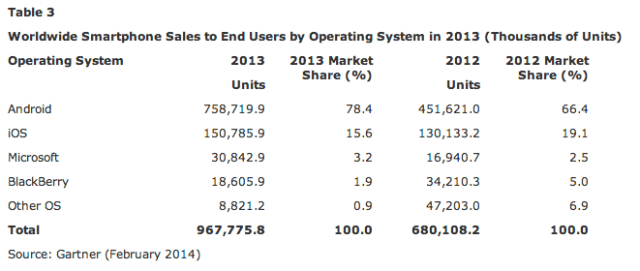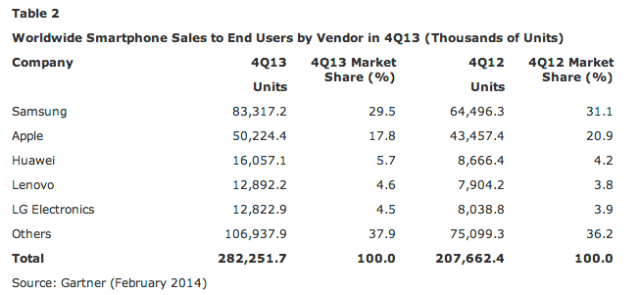
2013 was the year when the inevitable happened: worldwide sales of smartphones surpassed sales of the more basic (and generally cheaper) feature phone devices for the first time, according to Gartner’s latest market estimates – with 968 million smartphone device units sold to end users in 2013 out of a total of 1.8 billion mobiles sold.
That overall global mobile device total was up 3.5% on 2012′s figure.
The smartphone vs feature phone tipping point was reached in Q2 last year, according to the analyst, when Gartner previously noted smartphones had outstripped dumbphone sales globally for the first time. At that point Android was taking a 79% marketshare.
Now, looking at 2013 performance as a whole, Gartner said sales of smartphones accounted for 53.6% of overall mobile phone sales for the year — cementing their majority position vs feature phones.
Smartphone sales grew 36% in Q4, taking a 57.6% share of overall mobile phone sales in the fourth quarter, up from 44% year-over-year. That’s slightly lowered growth than smartphones were seeing in Q2 (46.5%) but sales of smarter portable handsets which let users download third party apps still outstripped sales of dumber mobiles throughout the year.
Gartner notes that mobile sales in saturated mature regions fell due to weaker demand during 2013, with emerging markets providing the engine for growth.
Smartphone growth for the year was led by adoption in Latin America (which had a 96.1% regional growth rate), the Middle East and Africa, Asia/Pacific and Eastern Europe, where Gartner notes sales grew by more than 50% in Q4.
The country with the highest individual smartphone sales growth was India, which exhibited a 166.8% increase in Q4. China also contributed significantly to global smartphone sales with a rise of 86.3% in sales during 2013.
Gartner pegged the still growing Android OS’s 2013 global marketshare at 78.4%; vs 15.6% for a continuing to shrink in marketshare iOS; and just 3.2% for Microsoft’s Windows Phone platform (although the ‘third ecosystem’ grew its global share). BlackBerry shrank to a marginal 1.9%.
The analyst said it expects sales of Android phones alone in 2014 to approach the billion mark.

In terms of the top smartphone vendors in Q4, Samsung still leads — taking a 29.5% share in the quarter, although that’s down on the year on year quarter when it bagged 31.1%.
Apple’s second placed share — of 17.8% for Q4 — is also down on Q4 2012 ,when Cupertino took just over a fifth (20.9%).
Gartner’s market data gives third place in Q4 to China’s Huawei, with 5.7% of the market, up from 4.2% in the year ago quarter:

“While the top three mobile manufacturers are dominating the global mobile phone market, their share collectively fell in the fourth quarter of 2013 and yearly as Chinese and regional brands continue to raise their share,” noted Gartner analyst Anshul Gupta in a statement.
Gartner attributed Samsung’s dip in share to a saturated high-end smartphone market in developed regions where its Galaxy-branded flagship handsets have previously been engines of growth. The analyst said the company needs to continue to develop its high end handset proposition, but also needs a clearer value proposition in the crowded mid-range, with simpler interfaces that can stand out on more than price.
Although Apple achieved record smartphone sales in Q4 its overall smartphone marketshare declined in the quarter and the year. However as smartphones took the majority crown from mobile phones in general Apple increased its portion of the latter pie.
Gartner also notes that Cupertino added Japanese carrier NTT Docomo in September, and inked a deal with China Mobile in Q4 — deals which it expects to help raise iPhone grow in Asia.
Third placed Huawei grew its smartphone sales 85.3% in Q4 to retain its bronze position, year over year, with Gartner noting that overseas expansion delivered strong results for the company in the fourth quarter, with growth in the Middle East and Africa, Asia/Pacific, Latin America and Europe.
Another Chinese phone vendor, Lenovo — which has just acquired Motorola from Google — also saw some strong growth in Q4 (63.1%) and 2013 in general (102.3%). The analyst expects the Motorola acquisition to give the company an opportunity to expand within the Americas, and the patent protection to “expand rapidly across the global market”.
“We believe this deal is not just about entering into the U.S., but more about stepping out of China,” added Gupta.
Gartner said it expects smartphones to continue to drive overall sales in 2014 — with an increasing number of manufacturers will realign their portfolios to focus on the low-cost smartphone sector. That means sales of high end smartphones will slow as rising sales of low- and mid-price smartphones in high-growth emerging markets shift the product mix to lower-end devices. And that in turn will lead to a decline in average smartphone selling price and a slowdown in revenue growth.
Read more : Gartner: Smartphone Sales Finally Beat Out Dumb Phone Sales Globally In 2013, With 968M Units Sold

0 Responses
Stay in touch with the conversation, subscribe to the RSS feed for comments on this post.